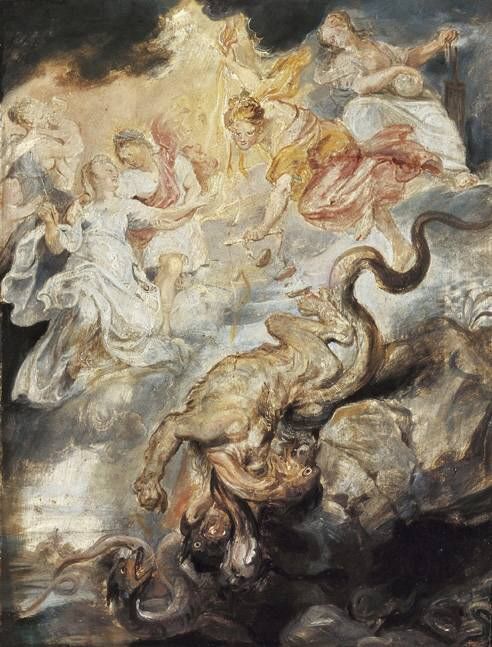#prophet Daniel
Explore tagged Tumblr posts
Text

I thought it would be funny
(also I headcanon Daniel looked up to Jeremiah when Jeremiah wasnt being thrown into prison cell after prison cell but that’s besides)
#bible fandom#book of jeremiah#jeremiah 38#Jeremiah#prophet daniel#daniel#Bible memes#Jeremiah’s been through a lot#I think he’s the most traumatized prophet of them all
122 notes
·
View notes
Text

Daniel in the Lion's Den
Artist: Briton Rivière (British, 1840–1920)
Title: Daniel's Answer to the King
Date: 1890
Medium: Oil on canvas
Collection: Manchester Art Gallery, Manchester, England
Daniel in the Lion's Den
The story of Daniel in the lions’ den, recorded in Daniel 6, is one of the most beloved in all Scripture. Briefly, the story involves Daniel, a prophet of the true and living God, who defies King Darius’s decree that the people should pray only to the Persian king for thirty days. Daniel, an otherwise law-abiding man, continues to pray to Israel’s God as he has always done. Evil men, who instigated the decree in the first place in order to entrap Daniel, of whom they were jealous, report him to Darius. The king is forced to put Daniel into a den of lions where he would be torn to pieces. King Darius is greatly distressed about having to punish Daniel, and he says to Daniel, “May your God, whom you serve continually, rescue you” (Daniel 6:16). God does indeed rescue Daniel, sending His angel to shut the mouths of the lions so they do not harm him. Daniel is removed from the lions’ den the next day, much to the relief of the king.
#painting#daniel#lion's den#lions#prophet daniel#book of daniel#bible story#bible scriptures#christianity#biblical art#briton riviere#british painter#19th century painting#holy bible#oil on canvas#artwork#european art
8 notes
·
View notes
Note
Are there any religious icons that you find erotic? I'm specifically thinking eastern orthodox christial religious iconography... Andrei Rublev and the like...
I do love the vibes of Eastern Orthodox art a lot, especially icons. I've looked through a decent number over the years for research purposes and usually none really grab at me. Overall something about the eyes and noses just doesn't call to me.
I think it's the same genre of reason those anime girls with the big eyes and tiny noses just aren't my jam.
Anyway! I did find one I enjoyed a lot in looking to answer this! I present:

Prophet Daniel by Andrei Rubelev.
Now, I know this might be a total cop out. This figure is mostly the plaster behind it. But that's the part I find most erotic I think. Immediately as I looked through an online gallery of his work, this one captured me.
The obliteration of identity, of original features. Now most of what you can see is the outline of the figure, the halo, the remains of cloth wrapped around him.
Everything decays. Even religious icons. Even art.
I find decay intensely erotic. I think decay is a sort of eroticism that's the other side of the coin of viscera and gore. Blood is this heady, fast, feverish eroticism. It pulls at your heart in a way that spurs it on. Rot instead invokes this slow, creeping eroticism.
It reminds me of one of my favorite monologues from one of my favorite movies (The Green Knight). Especially this quote; "This verdigris will overtake your swords and your coins and your battlements and, try as you might, all you hold dear will succumb to it."
Anyway, all of this to say, 10/10.
For the curious, the monologue in question:
youtube
20 notes
·
View notes
Text
Recognizing his own failures, however, the believer may yet be certain that God intends his salvation.
- Joint Declaration on the Doctrine of Justification by the Lutheran World Federation and the Catholic Church (§36)

#Christianity#Catholicism#Lutheranism#weakness#sin#trust#salvation#redemption#Prophet Daniel#saints#predestination
6 notes
·
View notes
Text

“At that time Michael, the great prince, the protector of your people, shall arise.
There shall be a time of anguish, such as has never occurred since nations first came into existence. But at that time your people shall be delivered, everyone who is found written in the book.
Many of those who sleep in the dust of the earth shall awake, some to everlasting life, and some to shame and everlasting contempt.
Those who are wise shall shine like the brightness of the sky, and those who lead many to righteousness, like the stars forever and ever.
But you, Daniel, keep the words secret and the book sealed until the time of the end.
Many shall be running back and forth, and evil shall increase.”
Daniel 12:1-4 NRSV CE
Artwork: Hendrick Goltzius (Dutch, 1558–1617) The Prophet Daniel in a Landscape (late 16th–early 17th century).
#catholicism#old testament#bible quotes#last judgment#prophet daniel#hendrick goltzius#sacred art#saint michael the archangel#san michele arcangelo
2 notes
·
View notes
Text


I tried but then St. Gabriel decided to come and visit instead ✨🕊️
4 notes
·
View notes
Text
Spiritual Strength (Daniel 10:2-19)
Do our outward practices and behaviors reflect our inward dispositions and attitudes?
At that time I, Daniel, mourned for three weeks. I ate no choice food; no meat or wine touched my lips; and I used no lotions at all until the three weeks were over. On the twenty-fourth day of the first month, as I was standing on the bank of the great river, the Tigris, I looked up and there before me was a man dressed in linen, with a belt of fine gold from Uphaz around his waist. His body…

View On WordPress
#daniel 10#demonic realm#evil#faith#fasting#god&039;s purpose#god&039;s will#hope#lent#perseverance#prayer#prophet daniel#spiritual disciplines#spiritual life#spiritual practices#spiritual strength#spiritual struggle
0 notes
Text
Cangiante: Michelangelo's Mode of Colour
Michelangelo‘s fresco, The Prophet Daniel, from the Sistine Chapel ceiling (Photo credit: Wikiwand) Cangiante The Prophet Daniel The third canonical mode of colour identified by Marcia B. Hall is cangiante, from the verb to change, cangiare (to change). It is associated with the artist Michelangelo (1475–1564), who decorated the ceiling of the Sistine Chapel during the High Renaissance, c.…

View On WordPress
0 notes
Text
Revelation 12: Saints versus Satan
A massive heavenly conflict, the ultimate in cataclysms. Is this oracle a glimpse into the prehistoric dawn of creation, long before humanity entered the stage? Or is it a harbinger of the terrifying time to come, the Tribulation? #Revelation12 #Satan
A massive heavenly conflict took up all of John’s vision, the ultimate in cataclysms. Was it historical? Allegorical? Prophetic? Is this oracle a glimpse into the prehistoric dawn of creation, long before humanity entered the stage? Or is it a harbinger of the terrifying time to come, the Tribulation? Then came war in heaven, Michael and his angels to engage in battle with the dragon. And the…

View On WordPress
#accuser#Archangel Michael#cast out of heaven#Daniel#daniel 12#Michael#New Covenant#opposer#prophet Daniel#revelation 12#revelation 12:7-12#saints#Satan#the devil
0 notes
Text

#this came to me in a prophetic dream#i stay off tumblr starting saturday afternoon to not get iwtv spoilers#had to come post this tho#daniel and armand#the vampire armand#daniel molloy#iwtv#chunky salsa speaks#devils minion
1K notes
·
View notes
Text

Belshazzar's Feast
Artist: Washington Allston (American, 1779–1843)
Date: 1817
Medium: Oil on Canvas
Collection: Detroit Institute of Arts, Detroit, Michigan, United States of America
Who Was Belshazzar?
Belshazzar was the last king of ancient Babylon and is mentioned in Daniel 5. Belshazzar reigned for a short time during the life of Daniel the prophet. His name, meaning “Bel protect the king,” is a prayer to a Babylonian god; as his story shows, Bel was powerless to save this evil ruler.
Belshazzar ruled Babylon, a powerful nation with a long history and a long line of powerful kings. One of those kings was Nebuchadnezzar, who had conquered Judah, bringing the temple treasures to Babylon along with Daniel and many other captives. Belshazzar was Nebuchadnezzar’s grandson through his daughter Nitocris. Belshazzar calls Nebuchadnezzar his “father” in Daniel 5:13, but this is a generic use of the word father, meaning “ancestor.”
During his life, King Nebuchadnezzar had encountered the God of Israel’s power and was humbled by Him (Daniel 4:34–37), but twenty years after Nebuchadnezzar’s death, his grandson Belshazzar “praised the gods of gold and silver, of bronze, iron, wood and stone” (Daniel 5:4). One fateful night in 539 BC, as the Medes and the Persians lay siege to the city of Babylon, King Belshazzar held a feast with his household and a thousand of his noblemen. The king demanded all the gold and silver cups and vessels plundered from the Jewish temple be brought to the royal banquet hall. They filled the vessels with wine and drank from them, praising their false gods (Daniel 5:1–4). The use of the articles from the Jewish temple was a blasphemous attempt for Belshazzar to relive the glory days of his kingdom, to recall the time when Babylon was conquering other nations instead of being threatened with annihilation from the Persians outside their walls.
As the drunken king reveled, God sent him a sign: a human hand appeared, floating near the lampstand and writing four words in the plaster of the wall: “MENE MENE TEKEL PARSIN.” Then, the hand disappeared (Daniel 5:5, 25). The king paled and was extremely frightened; he called his wise men and astrologers and enchanters to tell him what the writing meant, promising that “whoever reads this writing and tells me what it means will be clothed in purple and have a gold chain placed around his neck, and he will be made the third highest ruler in the kingdom” (verse 7). But none of the wise men of Babylon could interpret the words.
Hearing a commotion in the banquet hall, the queen (possibly Nitocris or even Nebuchadnezzar’s widow) came to investigate. She remembered Daniel as one whose wisdom Nebuchadnezzar had trusted, and she told Belshazzar to summon the Jewish prophet (Daniel 5:10–12). Daniel was brought before the king, but he refused the gifts Belshazzar offered him—the kingdom was not his to give, as it turned out (verse 17). Daniel rebuked Belshazzar’s pride: although the king knew the story of how God humbled his grandfather, he did not humble himself. Instead, he dishonored God by drinking from the sacred items of the temple (verses 22–23). Then, Daniel interpreted the words on the wall. Mene means “God has numbered the days of your kingdom and brought it to an end.” Tekel means “you have been weighed in the balances and found wanting.” Parsin means “your kingdom is divided and given to the Medes and Persians” (Daniel 5:24–28). Daniel never revealed what language those words belong to.
That night, the Persians invaded. Cyrus the Great, king of Medo-Persia, broke through the supposedly impenetrable wall of Babylon by cleverly diverting the river flowing into the city so that his soldiers could enter through the river duct. Historical records show that this invasion was made possible because the entire city was involved in a great feast—the feast of Belshazzar mentioned in Daniel 5. “That very night Belshazzar, king of the Babylonians, was slain, and Darius the Mede took over the kingdom” (Daniel 5:30–31). The demise of King Belshazzar illustrates the truth of Proverbs 16:18, “Pride goes before destruction, a haughty spirit before a fall.”
On View: Detroit Institute of Arts
#religious art#bible story#old testament#book of daniel#feast#people#belshazzar#prophet daniel#queen#writing on the wall#christianity#washington allston#american art#american painter#oil on canvas#19th century painting#christian art#detroit institute of arts
5 notes
·
View notes
Text

Probably the most blasphemous thing I’ve ever created... if you ignore all the David/Jonathan stuff.
#bible#bible fandom#bible fanart#daniel/darius#king darius#daniel the prophet#book of daniel#sketches#art#suggestive
529 notes
·
View notes
Text
I've had a realization


1K notes
·
View notes
Text



Drive the Dream with Daniel Ricciardo | West Australian 🇦🇺
#alyssa @danthrologie is a prophet bc here daniel is as a lil anthropologist 🔎🏔#let's see what else alyssa is a prophet of 🤞🤞🤞#daniel ricciardo#f1#*#**
283 notes
·
View notes
Text

"But the angel of the Lord went down with Azarias and his companions into the furnace: and he drove the flame of the fire out of the furnace, and made the midst of the furnace like the blowing of a wind bringing dew, and the fire touched them not at all, nor troubled them, nor did them any harm."
Prophecy of Daniel 3:49-50 Douay-Rheims Bible.
Artwork: William Holman Hunt, The Triumph of the Innocents.
1 note
·
View note
Text

never got around to posting this 1970s daniel molloy sketch... COME HITHER MY SCARABS
#FIRST POST TO THE IWTV TAG HAIIIIIIIIII.............#Everyone here is so much smarter nd cooler nd gayer than me like omg im nervous asf actually..#The way the ref pic didn't even include the hair grab#i took a pic of my own hand as reference just so i could incorporate it into the pic 😭😭😭 I AM FAITHFUL TO MY CRAFT!#i had a vision. Im like a prophet#btw#devil's minion#YEAPPPPPPP YEPPPPPPPPPPPP YEPPPPP YEPPPPPPPPPPP#THAT IS ARMANDS HAND YEP... YES THATS RIGHT NO THATS EXACTLY RIGHT#Idk if i can even tag this as dm fanart bc armands not even in the pic 😭😭😭 But thats his boytoy alright MHM YEP... YEP YEP YEAS#devil's minion fanart#daniel molloy#armandaniel#iwtv fanart#iwtv#johan's scrapbook
101 notes
·
View notes